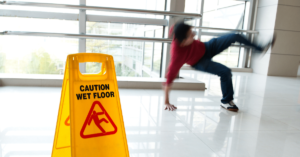
Slipping and falling in public can be embarrassing and painful, but many people fail to realize when another party is liable for their injuries. However, if your slip-and-fall accident occurred on another party’s property, you may be able to receive compensation for your injuries through a slip-and-fall lawsuit.
Read on to learn more about who is liable for slip-and-fall accidents in Connecticut.
When Is a Property Owner Liable for a Slip-and-Fall Injury?
In Connecticut, property owners have a duty of care for maintaining safe establishments for customers, visitors, and any individuals who enter their property. This responsibility includes ensuring that no hazardous conditions exist that could result in a slip-and-fall injury.
If a property owner failed to create a safe establishment, and this neglect led to a slip-and-fall injury, the property owner may be liable for the accident. However, to make a successful slip-and-fall case, plaintiffs must be able to prove that the following three conditions led to their injury:
- A dangerous condition was present on the property at the time of the injury.
- The property owner (defendant) knew about the hazardous condition or should have known about it.
- The property owner had time to resolve the hazard but failed to do so.
One important aspect of proving a property owner’s liability is supporting that the hazardous conditions led to the slip-and-fall accident. A few common dangerous conditions in slip-and-fall cases include:
- Wet floors
- Defective stairs
- Ice
- Leaky pipes
- Spills
- Cracked or slippery walkways
- Insufficient lighting
However, if property owners place appropriate signage near these conditions to warn visitors of their danger, they may not be liable for any injuries that occur.
In some cases, a party other than the property owner may be responsible for maintaining and caring for the property, such as a contractor or property manager. The plaintiff should be sure to identify which party is at fault before proceeding with the case.
When Is the Property Owner Not Liable For a Slip-and-Fall?
In some instances, the property owner may not be liable for injuries that occur on their premises.
For example, Connecticut has ongoing storm laws that dictate that property owners are not responsible for injuries that occur during a storm. If a visitor slips and falls during an ice or snowstorm or within a reasonable time after the storm, they cannot hold the property owner liable for their injuries.
Further, if the slip-and-fall victim was a trespasser, the landowner may not be responsible for any slip-and-fall injuries that occur. However, this exception may not apply if children enter the premises without permission.
Finally, the victim must file a slip-and-fall suit within two years of the injury to qualify for compensation.
If you have suffered an injury on another person’s property, you may be eligible for compensation. However, the best way to support your case and provide convincing evidence is to hire a competent slip-and-fall lawyer in Connecticut to represent you.
If you are considering filing a slip-and-fall lawsuit, contact our Jonathan Perkins Injury Lawyers at 800-PERKINS today. We serve clients throughout Connecticut, with offices in New Haven, Bridgeport, Hartford, Waterbury and New London.
